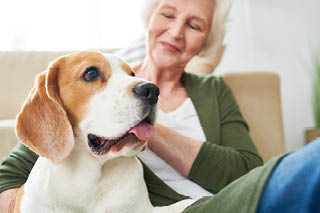The relationship between pets and humans has evolved over many centuries. From trained hunters and service animals, to loyal four-legged friends – the position of the humble pet has become one of an irreplaceable companion.
The rise of the ‘fur baby’ trend is a clear indicator our lovable pets are well and truly permanent members of the family.
Pets are becoming prominent members of the modern family
The evolution of the pet’s place in the family has been confirmed by recent data that reveals the fur baby is not only in vogue, but their position has been elevated to become a core member of the modern family. According to the Retirement and Inheritance Report, 1 in 10 Australian seniors plan to leave some portion of their estate to their pets.
A further 76.7% of seniors who plan to bequest at least some part of their estate to their pets say they are doing so to ensure their pets will be taken care of after they pass on. 42.8% of Australian seniors claim they’re leaving their pets an inheritance as they are an important part of their family, while 36.3% say they have no children or grandchildren to provide for, leaving their pets as their heirs.
Meanwhile an increasing amount of young people are choosing to begin their family unit with pets. In fact, data released by Gale revealed 44% of millennials consider their pets as “practice” for human children.
Does this mean pets are replacing children? Not at all. It’s clear from the data and social trends that a pet’s value as a companion is becoming more appreciated.
How is this shift benefiting humans?
There is a great deal of research out there that shows pet ownership is beneficial to the health and wellbeing of seniors:
-
Pets reduce the risk of heart disease
Because pets encourage seniors to get exercise (daily walks), and are just generally good for destressing, studies have found that the companionship offered by a pet helps minimise blood pressure and cholesterol, above and beyond what the individual might also be doing around diet and exercise.
-
Pets improve communication
Because pets present an opportunity for non-verbal communication, they’re an ideal way of engaging with seniors that are suffering from Alzheimer’s and dementia. This in turn can also help them with verbal communication. Not to mention, pets give you a great avenue to meet other pet owners and expand your social circle.
-
Pets provide good quality companionship
Pets are the ultimate companions. Not only will they provide their owners with unconditional love, but the routine of looking after a pet can provide owners with the same benefits human companionship can. The routine of looking after a pet – from walks, to vet visits, to pet holidays – ensures that owners are getting out into the world. This is a great prompt for people who may be too shy to interact with the world.
The fur baby is here to stay
The physical, mental and social benefits of having a pet can’t be contested. Remember, if you choose to own a pet, you must be committed to be a responsible pet owner. There are several guides to help the uninitiated, so you’re ready to give your pet a warm and welcoming home.





